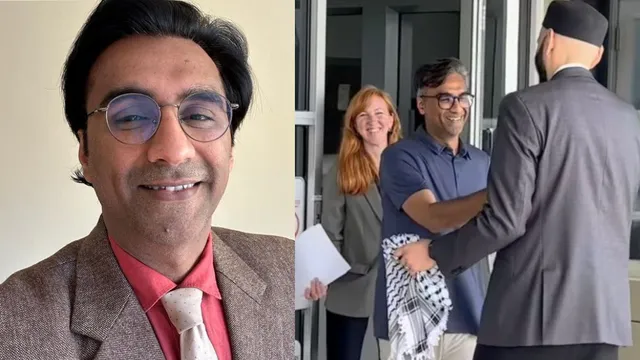- By Supratik Das
- Fri, 16 May 2025 08:58 AM (IST)
- Source:JND
Badar Khan Suri, an Indian scholar, was released from US immigration custody after close to two months, following a court ruling that found his detention violated constitutional rights. The case has sparked renewed debate about immigration policies and freedom of speech by the Trump administration. Suri, arrested by plainclothes federal officers near his residence in Arlington, Virginia, on March 17, 2025, was being detained at the Prairieland Detention Center in Texas. The US Department of Homeland Security said he had "close ties to a known or suspected terrorist" and charged him with "actively disseminating Hamas propaganda" on campus.
US District Judge Patricia Giles, ruling from Alexandria, Virginia, ordered Suri’s immediate release, stating that the government had failed to justify his continued detention. She cited violations of both the First Amendment (freedom of speech) and the Fifth Amendment (right to due process). “There was no evidence submitted to this court regarding statements that he made in support of Hamas, the judge noted. The Justice Department had contended that Suri was a risk to flee and a security threat to the country. But the court saw no grounds for the assertions and permitted his release on personal recognizance.
Who Is Badar Khan Suri? Why Was He Detained
Badar Khan Suri is an Indian scholar and visiting fellow at Georgetown University, was released from US immigration.Suri, a PhD in conflict studies and instructor of "Majoritarianism and Minority Rights in South Asia" at Georgetown, called his detention "Kafka-esque." Suri’s detention stemmed largely from his marriage to Palestinian-American Mapheze Saleh. Her father, Ahamed Yousef, was a former deputy foreign minister in the Hamas-led Gaza government and once served as an adviser to Hamas leader Ismail Haniyeh. Suri’s legal team argued that the government failed to provide any evidence that he supported or engaged in any activities related to Hamas. His wife, in a statement released by the American Civil Liberties Union (ACLU), said Suri was being punished for “marrying a Palestinian and supporting Palestinian rights.” He told NBC News after his release that, "I was chained to my ankles, my wrists, my body. Everything was chained." "For the first seven, eight days, I didn't even know where I was. I missed my own shadow," he continued, outlining the horrific conditions in custody. He accused the facilities of being filthy and claimed that his grievances against the ombudsman were dismissed.
Suri said that the well-being of his family was his main concern while in detention. "My oldest son is nine, and my twins are five. My wife said he was crying and needed counseling," he said to NBC News. His wife stated, “He told me he did not regret marrying a Palestinian or standing up for Gaza. If his suffering was due to that, he said, ‘I’ll wear it as a badge of honor.’”
Suri has moved back to his Virginia home, but he has to wait for additional immigration proceedings in Texas. The ACLU, which is supporting his legal defense, stated that his case is one of an increased crackdown on pro-Palestinian voices within US academic communities. The Trump administration is reportedly considering fast-tracking deportations by limiting habeas corpus rights for immigrants.

